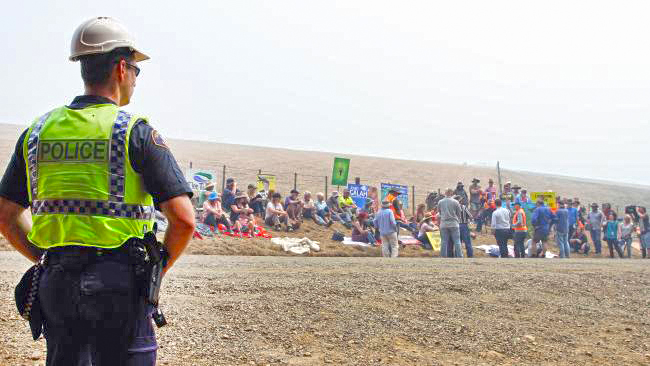Will Hodgman and Paul Harriss have allowed mindless ideology to trump common sense, to the detriment of Forestry Tasmania.

Last week’s Lapoinya protest, during which two people became the first to be arrested under Paul Harriss’s harsher laws. PHOTO Mercury
When representatives of industry, timber workers and the conservation movement signed an accord back in 2011, some of us hoped Tasmania’s crippling forest wars were over.
With an election still years away, supporters of the Tasmanian Forest Agreement thought its whole-of-community approach to forestry might become the new standard. But they overlooked the smouldering resentment of a certain Member of the Legislative Council.
Peace was the last thing on Paul Harriss’s mind in March 2014 when, having been elected to the lower house, he became resources minister. To him, the TFA was simply the previous government’s craven surrender to green extremism.
Righteous indignation fuelled his drive for harsher penalties for forest protest. He lost the battle for mandatory penalties in parliament, but won four-year maximum prison sentences when his bill passed in November 2014.
Now, after a long pause, the wars are back. In the first skirmish last week, two people were arrested at a coupe near Lapoinya in the state’s north-west.
In the middle of the Lapoinya confrontation Forestry Tasmania’s chairman, Bob Annells, and three of the remaining five board members resigned. The minister said these were just personal matters. That’s hard to believe, but if it’s true the timing was awful.
When he took the helm of Forestry Tasmania in 2012, Annells understood that an organisation in crisis, as it has been for many years now, does not need enemies.
For three years, despite some traumatic downsizing, the company’s staff and board have been steadily building new paradigms around its role, including its dealings with country communities. Throughout last year they worked hard to win over the people of Lapoinya.
My parents had a farm near Lapoinya when I was born. I don’t remember living there, but I do know what it’s like to grow up in the bush. You can build a deep, powerful affinity with it, such that if it’s threatened you won’t like it. You may feel compelled to oppose its removal.
Jessica Hoyt, now a nurse living in Hobart, can’t see Lapoinya as others do – as production forest with no special values – because it was her childhood home. Asked about the proposed harvesting after her arrest under the new laws, her simple, passionate response was “it’s wrong”.
When first announcing its workplace protest bill the government said it was targeted at forest “extremists”. Its first two victims have been Hoyt and a retired Wynyard anaesthetist, also with strong personal ties to the district. If these are extremists then I don’t understand the word.
But Lapoinya, which for all I know may be a perfectly legitimate harvest, is a side issue. The root cause of Forestry Tasmania’s problems won’t be found in native forest operations, but in politics.
The TFA opened a door to a big market expansion via Forest Stewardship Council certification. We don’t yet know the outcome of the FSC application, but the government couldn’t have helped its cause by “ripping up” the TFA and raising protest penalties.
Then came news late last year of the “authorised” sale of 50,000 hectares of hardwood plantations – the backbone of Forestry Tasmania’s long-term viability – to “offset losses” for two more years. How is that different from a receivers’ fire sale when a bankrupt business is being wound up?
Sustainability of wood supply is a key requirement for FSC certification. Losing control of that plantation resource raises questions about the company’s capacity to meet its legislated targets.
When a government is elected, it has a responsibility to govern for all. Will Hodgman should know that hostility towards portfolio stakeholders is no basis for a ministerial career. He should not have put Harriss in charge of forestry operations.
But it was the blind leading the blind. The premier has for many years echoed Harriss’s extreme pronouncements. Held captive by their shared ideological spin, Paul Harris and Will Hodgman have dug themselves a deep, dark hole, and it’s only getting deeper.
Their only way out is to repudiate their present attitudes and policies, but for them that would obviously be a bridge too far. Their mindless intransigence may prove fatal for Forestry Tasmania.
